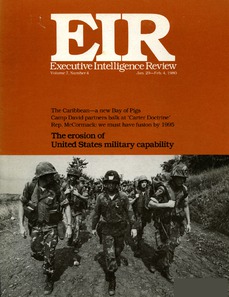Departments
From the Editor-in-Chief
by Daniel Sneider
Editorial Comment
by Nora Hamerman
Campaign 1980
Congressional Calendar
by Barbara Dreyfuss and Susan Kokinda
Energy Insider: A New Teapot Dome Scandal?
by William Engdahl
Economics
‘A German on a Stone ... He’ll Turn It to Bread’
by Laurent Murawiec
“Put a German on a stone and he’ll turn it into bread” is a Russian saying very familiar to West German businessmen. Their response to Jimmy Carter’s plea for embargo and trade sanctions against Eastern Europe, traditionally their leading export market, is not a little anger, and determination that threats, armtwisting and blackmail from London and Washington will not be allowed to prevent them from absolutely increasing trade with the Soviet Union and its allies.
Gold: Who Benefits in the Shake-Out?
by Alice Roth
Domestic Credit: Deficit Bigger Than Carter Admits
by Lydia Schulman
Foreign Exchange: Arab Money Shifts Show Dollar Weakness
by Richard Katz
Agriculture: In Search of Grain Export Markets
by Susan B. Cohen
Trade Review
Business Briefs
Special Report
The Erosion of U.S. Military Capability
by Uwe Parpart
In 1961’s Cuban missile crisis, the U.S.A. had clear superiority in virtually all military categories; Khrushchev’s move into Cuba proved militarily untenable. In the current Afghan crisis, Jimmy Carter finds himself in Khrushchev’s position. Massive Soviet superiority across-the- board is not even primarily due to their own military build-up, but to an in-depth erosion of U.S. military capabilities, an erosion of the U.S. industrial economy.
General-Purpose Forces: The Soviets’ Superiority
by Dean Andromidas
America’s Mercenary Army: Drugs and Illiteracy
by Susan Welsh
Research and Development: The Aura of Poverty
by Dr. Steven Bardwell
Gen. Richardson: ‘Painted Ourselves into a Corner’
Exclusive interview with a top military officer – Defense Specialist: “The Risks Are Just Too Great.”
International
Europe: In the Vise of the Superpowers
by Vivian Freyre Zoakos
The world is no longer in a diplomatic situation, it is in a political-military situation. The European powers, trying to straddle the fence, are being told they cannot do that any longer.
Will Jimmy Carter Attempt Another ‘Bay of Pigs’?
by Cynthia Rush
The President plays war-games in the Caribbean as the British advise him to ready an invasion, or at least a blockade of Castro’s Cuba.
Jesuit ‘Mullahs’ Lead Latin Insurrections
by Gretchen Small
Guatemala’s ‘Clerical’ Revolt Targets Mexico
by Dolia E. Pettingell
What is Probe International? – ‘Novelist’ Fuentes: ‘The Return of Strangelove’
El Salvador: As Many as One Million Could Die
Camp David’s Partners Balk at the New ‘Carter Doctrine’
by Mark Burdman
The aim of Camp David was always a NATO-extension into the Middle East in the form of a military alliance centered around Israel and Egypt. But in light of Carter’s dangerous bluffing act with the Soviet Union, new strains have developed to threaten the Egypt-Israel pact.
Prince Fahd: Willing To Supply the Soviets
U.S. Military Forces Are Checkmated: What Comes Next?
by Paul Goldstein
International Intelligence
National
The Iowa Caucuses: It Wasn’t Really a Democratic Vote
by Kathy Burdman
Jimmy Carter “won” the Iowa caucuses Jan. 21, but it’s very doubtful how many Democrats actually voted for him without being paid for it, and even less how much actual voter support he has in the state. On top of the usually methods of vote-rigging, it appears independents and Republicans turned out for the President in large numbers.
Mike McCormack: Battling Carter for Fusion Power
by Marsha Freeman
The Carter Administration continues its attack on all U.S. technology development, especially in the energy field where massive new cuts in fusion research are due. But Rep. McCormack, whose committee has proved the feasibility of commercial fusion by 1995, is mustering Congressional forces for a fight.
National News



